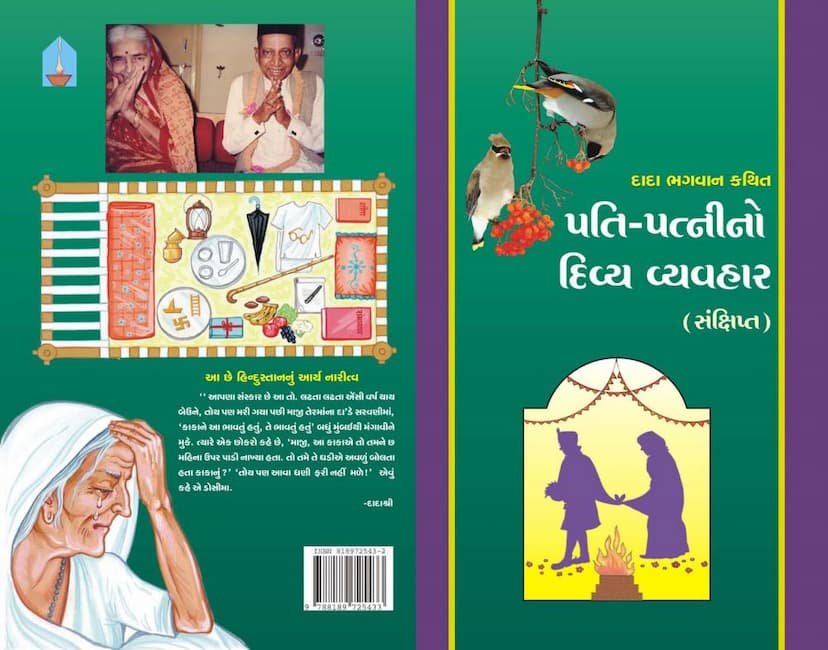Pati Patni No Divya Vyavahar Sankshipt
Added to library: September 2, 2025

Summary
This document is a Gujarati text titled "Pati Patni No Divya Vyavahar Sankshipt" (Abridged Divine Conduct of Husband and Wife) by Dada Bhagwan. It's published by the Dada Bhagwan Foundation and offers spiritual guidance on marital relationships, drawing from the teachings of Dada Bhagwan.
Here's a breakdown of the key themes and content presented in the text:
Core Message: The text emphasizes the importance of harmonious marital relationships, offering practical spiritual advice to overcome common conflicts and misunderstandings between husbands and wives. It aims to guide couples toward a divine and ideal married life, rooted in understanding, adjustments, and mutual respect, ultimately leading towards spiritual growth.
Key Themes and Concepts:
- The Nature of Marriage and Conflict: The book begins by contrasting the ideal of a harmonious marital bond (often seen in older generations or implied in traditional values) with the prevalent conflicts, arguments, and differences of opinion in modern relationships. It acknowledges that such issues are amplified in the current era (Kaliyuga).
- Dada Bhagwan's Philosophy: The text heavily relies on Dada Bhagwan's teachings. It introduces Dada Bhagwan as a "Gnani Purush" (Knower of the Self) who experienced self-realization and offers a unique spiritual path called "Akram Marg" (the path of the effortless). This path allows for rapid spiritual progress and resolution of worldly problems through spiritual understanding.
- Understanding the Self vs. the Non-Self: A central theme is the distinction between the "I" (the self, the pure soul) and "My" (possessions, body, mind, relationships, ego). The book encourages recognizing the true self, which is eternal and unchanging, separate from the temporary and relative "My."
- Cause of Conflict: The text attributes marital discord and conflicts to several factors:
- Ignorance (Ajnanta): Lack of understanding of the true nature of the self and the world.
- Ego (Ahankar): The strong sense of "I" and "Mine," leading to possessiveness and conflicting opinions.
- Selfishness and Expectations: Focusing on one's own desires and expectations rather than mutual understanding.
- Misunderstanding and Lack of Communication: Not listening or communicating effectively, leading to assumptions and further conflict.
- Dwelling on Mistakes: Focusing on the faults of the partner rather than the positive aspects.
- Mismanagement of Relationships: Lack of proper handling of personal relationships.
- Attachment (Aasakti) and Desire (Vishay): Uncontrolled desires and attachments lead to conflict.
- Solutions and Guidance: Dada Bhagwan offers practical, spiritual solutions:
- "Adjust Everywhere": A fundamental principle is to make adjustments in every situation.
- Understanding the Partner's Perspective: Seeing things from the other's point of view, recognizing their "viewpoint" even if it differs.
- Moksha through Marriage: The belief that a truly spiritual and adjusted marital life can lead to liberation.
- "Dada's Vision": Encouraging couples to adopt Dada Bhagwan's perspective, which is free from ego and judgment.
- Pratikraman (Self-Reflection and Repentance): Regularly admitting one's own faults and seeking forgiveness, both internally and externally.
- Spiritual Practices: Advocating for self-knowledge and understanding the true self.
- Acceptance and Letting Go: Accepting the partner as they are and letting go of expectations.
- Treating the Partner as a Friend: Fostering a friendly relationship rather than a relationship based on demands and complaints.
- Separation of Departments: Dada Bhagwan suggests clear delineation of responsibilities (e.g., household vs. finances) to minimize clashes.
- The Importance of Forgiveness: Emphasizing the need to forgive and forget, and to ask for forgiveness.
- "No-My" (Noy Mari) Approach: Challenging the sense of "mine" and "yours" in relationships, which is seen as the root of conflict.
- Spiritual Love: Distinguishing between worldly attachment and true spiritual love, which is unconditional.
- The Role of the Wife: While not blaming women, the text often addresses wives to be understanding, adjust, and nurture the relationship with love and respect, while also acknowledging the husband's role in creating a harmonious environment. It also subtly highlights the potential for women to use their emotional intelligence constructively.
- The Role of the Husband: Husbands are encouraged to be understanding, to forgive, to lead with love, and to nurture their wives, recognizing that their behavior influences the marital harmony.
- The Akram Way: The core of Dada Bhagwan's teachings, the Akram path, is presented as a direct and effortless way to achieve self-realization and resolve worldly issues through the grace of the Gnani Purush.
Structure and Content:
The book appears to be a compilation of dialogues and questions-answers between Dada Bhagwan and devotees who presented their marital problems. The text is structured around various aspects of married life and conflict resolution, indicated by chapter headings or thematic sections such as:
- "One Family" (Wan Famili)
- "Conflict in the Home" (Gharma Klesh)
- "Differences between Husband and Wife" (Pati-Patni Maa Matbhed)
- "Arguments During Meals" (Khati Vakhte Khit-Peet)
- "Need a Husband, Not Husband-hood" (Dhani Khpe, Dhani Panu Nahi)
- "The Habit of Finding Faults in Others" (Samani Bhool Kadhvani Tev)
- And many more specific topics addressing common marital issues.
Concluding Remarks:
The text concludes with prayers and a reiteration of Dada Bhagwan's teachings, emphasizing the path to self-realization and the resolution of worldly conflicts through His spiritual science. It also includes contact information for obtaining further publications and connecting with the Dada Bhagwan Foundation.
In essence, "Pati Patni No Divya Vyavahar Sankshipt" is a spiritual guide for married couples, offering practical, yet profound, solutions to marital problems based on Dada Bhagwan's spiritual insights. It aims to transform marital relationships from sources of conflict into pathways for spiritual growth and eventual liberation.